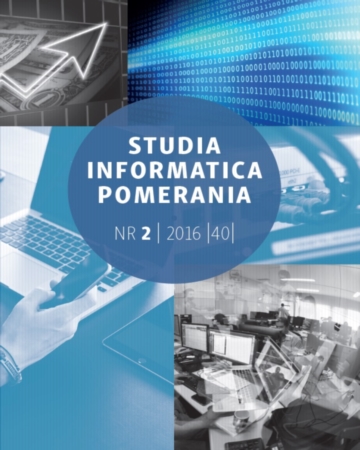
ISSN: 2451-0424
eISSN: 2300-410X
OAI
DOI: 10.18276/si.2016.39-01


Issue archive /
nr 39
Nowe technologie informacyjno-komunikacyjne w procesie pozyskiwania wiedzy o klientach sieci handlowych – wybrane zagadnienia
(INFORMATION AND COMMUNICATION TECHNOLOGY IN THE PROCESS OF KNOWLEDGE ACQUISITION ABOUT RETAIL CHINS CUSTOMERS – SELECTED PROBLEMS)
| Authors: |
Katarzyna
Bilińska-Reformat
Uniwersytet Ekonomiczny w Katowicach Wydział Zarządzania Ewa Frąckiewicz Uniwersytet Szczeciński, Wydział Nauk Ekonomicznych i Zarządzania |
| Keywords: | retail chains ICT customer’s knowledge |
| Data publikacji całości: | 2016 |
| Page range: | 10 (5-14) |
Abstract
Retail chains in their marketing strategies should focus on target markets needs. Such attitude enables them developing competitive offer, which fulfill customers needs and expectations. Used marketing procedures toward target segments are basing on knowledge about customers. Knowledge acquisition is basing on use of different ICT. The goal of the paper is to identify and to present selected IT solutions used by retail chains in knowledge acquisition about the customer, as well as indicating the cases of use that knowledge in marketing activity of retail chains. The subject of the study are international retail chains functioning in Poland on FMCG market (case of Tesco). For the purpose of implementation of the assumed goals, the following research methods are applied: critical analysis of the literature of the subject and case-study method indicating best marketing practices associated with application of knowledge about customers in strategic activities of commercial retail chains.
Download file
Article file
Bibliography
| 1. | Barney, J. (1991). Firm resources and sustained competitive advantage. Journal of Management, 77 (1), 99–120. |
| 2. | Bilińska-Reformat, K. (2015). Relacje sieci handlu detalicznego z klientami i dostawcami na tle uwarunkowań globalnych i lokalnych. Katowice: Wydawnictwo Uniwersytetu Ekonomicznego w Katowicach. |
| 3. | Bilińska-Reformat, K., Sztangret, I. (2014). Produkty IT dla kompetentnego sektora handlu. Ekonomika i Organizacja Przedsiębiorstwa, 6 (733), 55–67. |
| 4. | Bilińska-Reformat, K., Reformat, B. (2014). Wykorzystanie mediów społecznościowych w działaniach promocyjnych sieci handlowych. Marketing i Rynek, 4, Komunikacja rynkowa: Innowacje – Media – Design, 208–215. |
| 5. | Burnett, K. (2002). Relacje z kluczowymi klientami. Analiza i zarządzanie. Kraków: Oficyna Ekonomiczna. |
| 6. | Conner, K.R., Prahalad, C.K. (1996). A resource-based theory of the firm: Knowledge versus opportunism. Organization Science, 7 (5), 477–501. |
| 7. | Consumer Goods and Retail Insights (2011), Customer centric retailing, now you know what your customer really want, Roland Berger Strategy Consultants, s. 7. Munich: Consumer Goods & Retail Competency Center. |
| 8. | Cox, R., Brittain, P. (2000). Zarządzanie sprzedażą detaliczną. Warszawa: PWE. |
| 9. | Domański, T., Bryła, P. (2010). Marketing produktów żywnościowych. Warszawa: PWE. |
| 10. | Domański, T. (2005). Strategie rozwoju handlu. Warszawa: PWE. |
| 11. | Dyche, J. (2002). CRM. Relacje z klientami. Gliwice: Helion. |
| 12. | Fanpage Trends, Sotrender, czerwiec 2013, 57. |
| 13. | Frąckiewicz, E., Rudawska, E. (2005). CRM jako narzędzie zarządzania relacjami z klientem na rynku usług. Szczecin: Wydawnictwo Naukowe Uniwersytetu Szczecińskiego. |
| 14. | Grzesiuk, A. (2010). Handel detaliczny jako pracodawca we współczesnej gospodarce. Poznań: Wydawnictwo Uniwersytetu Ekonomicznego w Poznaniu. |
| 15. | Krawczyk, S. (red.) (2011). Logistyka. Teoria i praktyka. Warszawa: Difin. |
| 16. | Otto, J., Olczak, A. (2007). Marketing w handlu i usługach. Łódź: Wydawnictwo Politechniki Łódzkiej. |